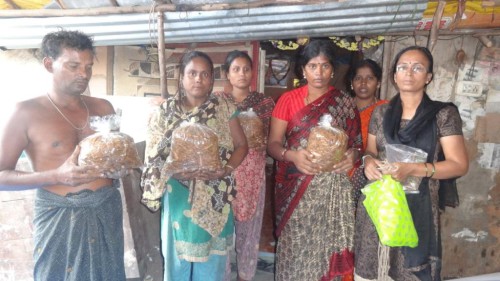Posted by Alliance of Indian Wastepickers
Written by Sowbhagya & Chethan C.N. (originally written in Kannada)
Region Asia-Pacific
Country India
November 05, 2015
Translated by Malleshwari Baddela
Written by Sowbhagya & Chethan C.N. (originally written in Kannada). Waste Narratives. 11/03/2015
 Rising prices of pulses and meat have impacted the poor significantly. Waste-pickers with little income are left to fend themselves against the high costs of food. Even within waste-pickers, the migrant community members (from other states) are worst off. They have no formal linkage with public distribution system- thus, nothing nutritious and filling left in their diet. Many of the children of migrant waste-pickers are identified with malnutrition and protein deficiency.
Rising prices of pulses and meat have impacted the poor significantly. Waste-pickers with little income are left to fend themselves against the high costs of food. Even within waste-pickers, the migrant community members (from other states) are worst off. They have no formal linkage with public distribution system- thus, nothing nutritious and filling left in their diet. Many of the children of migrant waste-pickers are identified with malnutrition and protein deficiency.
Seven years back, an experiment of growing oyster mushrooms to counter malnutrition and protein deficiency was done in Amravati district of Maharashtra. It didn’t succeed for many different reasons including the absence of relevant subsidies etc. The idea of countering malnutrition and protein deficiency by oyster mushroom cultivation stayed in the head of Nalini Shekar, founder of Hasiru Dala. She wanted to do something around it for a long time.
Oyster mushroom cultivation is very easy to do. You don’t need much of physical space. Chaffed paddy straw, an empty packet – cover: size 18 inches, and mushroom seeds is all what one needs. Chaffed paddy straw is easily available and is the leftover following harvest. Straws have to be chopped in three inch pieces, after that the straws have to be boiled for one hour. Once boiled, the water is to be drained off. Then straws are spread on a clean dry cloth and left for drying under shade for two hours. The straws will be still moist. Continued here….
Tweet

